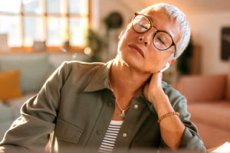Medical expert of the article
New publications
Cricky neck: should or shouldn't you be concerned?
Last reviewed: 29.06.2025

All iLive content is medically reviewed or fact checked to ensure as much factual accuracy as possible.
We have strict sourcing guidelines and only link to reputable media sites, academic research institutions and, whenever possible, medically peer reviewed studies. Note that the numbers in parentheses ([1], [2], etc.) are clickable links to these studies.
If you feel that any of our content is inaccurate, out-of-date, or otherwise questionable, please select it and press Ctrl + Enter.

Many people have neck crunching when turning their head, when tilting their head in different directions, but there is no pain or other discomfort.
In this case there is no need to worry because.
Causes of the neck crunch
Because the sound defined as a physiologic "crunch in the neck" is due to the rapid release of gas bubbles (oxygen, nitrogen and carbon dioxide contained in the synovial fluid of the joint), which then burst. This occurs when the joint capsule (cavity) of the paired arcuate or facet joints of the cervical vertebrae, which are formed by the articular processes of neighboring vertebrae and connect their bodies, is stretched.
The crunch can also be caused by friction of the tendons attaching muscles to the spinous processes of the cervical vertebrae against the bones: when they stretch during movement and then return to their original position (the tendon may shift slightly), resulting in a sudden crunch. And in such cases, most often the neck crunches when making circular movements.
However, crepitation, especially when there is constant neck crunching or neck pain and crunching, may have a cause related to spinal problems and may be a clinical symptom:
- Cervical facet syndrome;
- Cervical osteochondrosis;
- Osteoarthritis of the cervical spine - cervical spondylosis with osteophyte formation (growths of ossified cartilage in the vertebrae);
- Rheumatoid arthritis;
- Herniated disc;
- Cervical vertebral dislocation or spondylolisthesis.
Crunching and neck pain is one of symptoms of ligamentous damage to the ligamentous apparatus of the spine in its cervical region.
If a child's neck crunches, firstly, it may be a physiological crunch (in the first years of life the child's musculoskeletal system is still forming). But parents should pay attention and consult a doctor when a crunch accompanied by pain occurs in childhood or adolescence: it may be associated with juvenile rheumatoid arthritis or Bechterew's disease - juvenile ankylosing spondylitis.
Risk factors
Among the risk factors, experts note:
- Age-related degenerative-dystrophic changes in the joints of the spine, articular cartilage and intervertebral discs, as well as weakening of the neck muscles;
- Asthenic body type and underweight;
- Posture disorders, particularly slouching;
- Cervical spine injuries, including rotational subluxations of the cervical vertebrae;
- Anomalies of the vertebral bodies and articular joints;
- Cervical scoliosis;
- Connective tissue dysplasia (leading to instability of cervical and other spinal joints).
Pathogenesis
Considering the mechanism of crunching in the neck as a symptom of osteoarthritis of the cervical spine, vertebrologists point to the key pathogenetic factor - the progressive loss of articular cartilage that protects the underlying bones. In this case, the bones begin to touch during movement of the spinal joint, causing crepitation (which is amplified by the presence of osteophytes).
A similar process occurs in intervertebral hernia, because the shift and bulging of the fibrous-cartilaginous intervertebral disc between the bodies of two neighboring vertebrae leads to denudation of bony structures, their contact and mechanical friction.
Diagnostics of the neck crunch
Treatment of the neck crunch
What should you do if your neck crunches when it is a physiological crunch? When sitting - take small pauses with neck warm-up (normal head tilts in different directions, smooth rotational movements of the head) sleep on the "right" pillow, etc.
If your neck crunches and hurts, you need to treat the spinal condition that is causing it. More information in the articles:
- Cervical osteochondrosis treatment
- Drug treatment of osteoarthritis
- Local treatment of osteoarthritis
- Physiotherapy for osteoarthritis
- Spinal hernia treatment
It is also recommended to perform special exercises, read:
More information of the treatment
Prevention
When crunching and pain in the cervical spine, the main prevention is the treatment of the corresponding diseases and pathological conditions.

